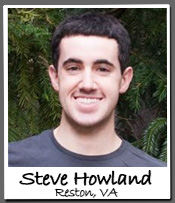By day, Steve Howland is an engineer for Orbital Sciences in Dulles, Virginia. But after school, this seasoned FIRST alumn mentors high school FIRST Robotics teams.
Q: Tell us about the program you work with. FIRST is a program dedicated to getting more students excited about science, math and engineering throughout all grade levels. FIRST Robotics is the “big” competition for high school, where students build a robot each year to complete different tasks in a fast-paced game scenario. Q: What made you want to get involved with this program? I joined FIRST in ninth grade and participated all four years of high school, eventually becoming team captain. I then helped out a team down the road while I was in college, since they didn’t have as much engineering support. Now that I’ve graduated, I’ve joined a third team, and I head over almost every day during the winter build season to volunteer. Q: What do you do as a volunteer? I am a mentor, so I try to provide a more experienced perspective on everything from brainstorming to shop safety. Q: How much time do you spend volunteering? The build season last about six weeks, and during that time I’m at the school 3-4 hours almost every weeknight. There’s scattered meetings through the rest of the year, but January and February are the busy months. Q: What's the most fulfilling part about working with the afterschool program? I chose FIRST because it was the program that I credit with getting me into my college and because it has such an inspirational message of getting anyone who’s interested involved in engineering. This is only my first year with this team, but I love seeing the students when the robot first drives around and does what it’s supposed to. This year’s challenge was shooting basketballs, so that was the big exciting moment. Q: What's the most challenging part? There are a few main challenges for me. The first is knowing how to best be involved without becoming too far entrenched in the project myself. As I used to be a student participant, sometimes I want to go back to the point when I got to bring my designs to life. Instead I need to take a more hands-off approach and suggest a few ideas, but still offer experienced advice when I can. The other main challenge is to get students to step up when I know that they want to say something but are just a little too shy. Students are used to teachers talking at them all day; they don’t typically have a chance to be innovative. Some students thrive in this environment but others hang on the outskirts. It’s tough to bring them out of their shells, but as they begin to see the mentors as friends they do slowly come forward. Q: What advice would you give to other professionals thinking about volunteering with an afterschool program? Afterschool programs like FIRST can be difficult to schedule work and life around. Try to be there often, but don’t sacrifice too much or you’ll just burn out and not return next year. Q: What do you think is the biggest misconception about STEM fields and careers? Either that they’re too hard, or that they’re not fun. The first one is arguable, but STEM careers are so much fun that they are more than worth the effort. Q: What advice would you give to young people about studying STEM? Becoming involved in STEM is possibly the smartest decision you could make. If you stick with STEM, you can get a job practically anywhere working on the most advanced technology in the world, or you can start a company where you create that technology yourself. People with a strong background in STEM will always be in high-demand. | 







